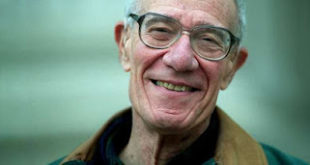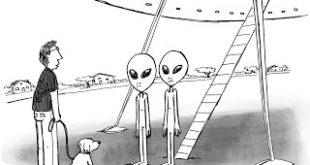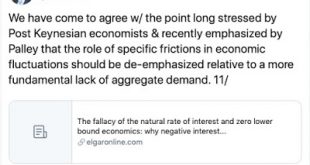(1924-2023)Robert Solow, who was a member of the editorial board of the Review of Keynesian Economics (ROKE), died in December 2023. Solow holds a special place in the history of macroeconomics, and he was a strong supporter of the ROKE project. In this brief note I want to honor Solow’s contribution to economics and to place on record his contribution to ROKE.Histories of macroeconomics tend to emphasize the disputes between Keynesians and Monetarists, at least up to the 1970s. Those...
Read More »Gatekeepers and herd behavior: On Tooze and the radicalization of Krugman
"But that one is holding the poop!"Adam Tooze, the author of the monumental Crashed (who was, incidentally, student of Wynne Godley, one of my mentors), wrote a piece for the London Review of Books that has received a lot of praise. While it reviews Paul Krugman's latest book, it provides an overview of the radicalization of New Keynesians, or at least some, that dominate both in academia, and in the corridors or power. The gatekeepers of knowledge and academic and intellectual influence,...
Read More »Larry Summers on Effective Demand
On of the issues between more mainstream Keynesians and their more heterodox counterparts is whether frictions are central for Keynesian results or not. Since the Neoclassical Synthesis the conventional view is that some rigidity or friction was behind the problems of unemployment, be that the liquidity trap (the Keynesian case with the flat LM, since Hicks 1937), the rigidity of wages (since Modigliani 1944), or some other coordination problem (mostly in the New Keynesian literature).In...
Read More »Tom Palley on Zero Lower Bound (ZLB) Economics
From the abstract: This paper explores zero lower bound (ZLB) economics. The ZLB is widely invoked to explain stagnation and it fits with the long tradition that argues Keynesian economics is a special case based on nominal rigidities. The ZLB represents the newest rigidity. Contrary to ZLB economics, not only does a laissez-faire monetary economy lack a mechanism for delivering the natural rate of interest, it may also lack such an interest rate. Moreover, the ZLB can be a stabilizing...
Read More »Simon Wren-Lewis on New Classical Economics and the Financial Crisis
New paper by Wren-Lewis titled "Unravelling the New Classical Counter Revolution." It provides a strong New Keynesian critique of the New Classical/Real Business Cycle schools. He argues, correctly in my view, that the problem is the abandoning of the Keynesian method of analysis. I'm less keen on microfoundations. Or at least on marginalist microfoundations. But it is important to understand how much the fundamentalist views of Lucas and Prescott have affected the profession.From the...
Read More » Heterodox
Heterodox




